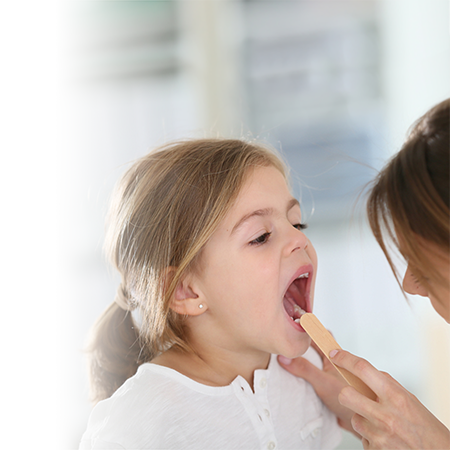Have you ever heard about scarlet fever? It's important to recognize this childhood illness for timely management.
What is scarlet fever?
Scarlet fever is a contagious disease caused by bacteria called Group A streptococcus. It is a rather common complication of a throat infection: streptococcal pharyngitis. Many people have this type of pharyngitis (strep throat) without suffering from scarlet fever. This infection is more frequent in children between the ages of 5 and 15, but can also affect adults.
These bacteria are transmitted by air-born droplets carried in secretions of an infected person's cough or sneeze. It can also be transmitted through contact with surfaces contaminated by secretions.
What are the signs and symptoms of scarlet fever?
The first signs and symptoms of scarlet fever generally appear 2 to 4 days after the bacteria enter the human organism. They include:
- high fever
- intense sore throat
- redness and swelling of the throat
- white spots in the throat, and
- swollen glands in the neck
The sore throat can be very intense and make eating and hydration difficult. About two days following the start of primary symptoms, the onset of a reddish rash on the skin and a whitish coating on the tongue can be observed.
The skin rash first appears on the neck, face and flexion creases (e.g. inside the elbows), then spreads to the rest of the body. It takes the form of small red spots with a sandpaper-like feel. When the whitish coating on the tongue disappears, it is replaced by tiny red bumps (giving it a raspberry-like appearance) on the tongue and roof of the mouth.
Other less common symptoms may also occur, including:
- headaches
- nausea
- vomiting, and
- stomach aches
Scarlet fever lasts about seven days
It's important to see a doctor if you think your child or a family member suffers from scarlet fever. The doctor will do the necessary tests to make a diagnosis and prescribe the appropriate treatment.
How is scarlet fever treated?
Because scarlet fever is caused by bacteria, an antibiotic treatment will be prescribed. This type of treatment helps to diminish symptoms, shorten it's duration, and prevent spreading and possible complications. The pharmacist will evaluate if it is the best treatment for the affected person and provide the necessary advice.
It is important to follow the full course of treatment. Twenty-four hours after the start of an antibiotic treatment, the infected person is no longer contagious.
Other measures can help to ease symptoms. Here are some examples:
- Drink plenty of liquids.
- Suck on ice chips.
- Eat soft foods to diminish sore throat.
- Rest and engage in relaxing activities.
- Keep ambient air moist.
- Use acetaminophen or ibuprofen to relieve pain and fever.
- Avoid aspirin (acetylsalicylic acid) or any product that contains it for children and adolescents.
Ask your pharmacist to provide you with additional information on the ways to relieve symptoms of scarlet fever.
How can scarlet fever be prevented?
Contrary to many childhood illnesses, scarlet fever can be prevented through immunization. However, some basic preventative measures can be taken:
- Wash children's hands regularly, and wash them as soon as possible when they cough, sneeze or blow their noses.
- Teach children to sneeze and cough into a tissue.
- Show children how to sneeze or cough in the crook of their elbow if it cannot be done in a tissue.
- Disinfect the surfaces that were touched be the infected person with an alcohol-based cleaner.
- Avoid close contact with anyone known to be infected.
If you think your child or someone around you is affected by scarlet fever, don't hesitate to consult your pharmacist, who will be able to direct you to the appropriate resources, according to your situation. Your pharmacist can also answer your questions about the illness and its treatment.

